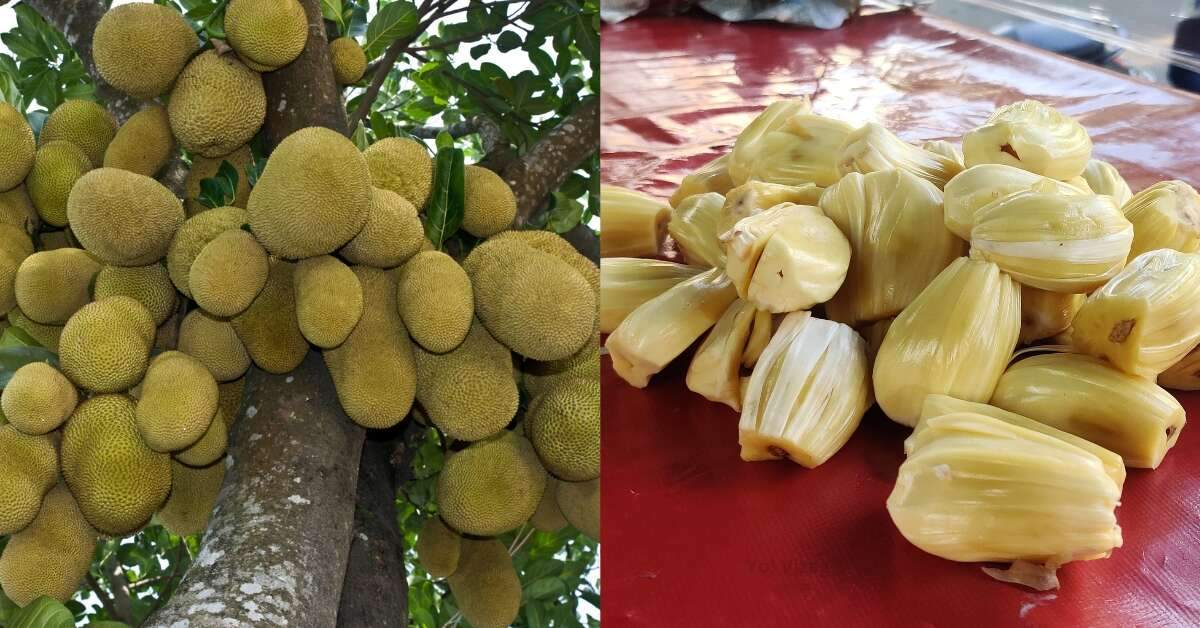

Jackfruit made its way into the markets of Andhra Pradesh this past July. Huge and bulky, this green and spiky fruit comes by every year, dethroning mangoes and emerging as the latest seasonal delicacy. This year, too, the fruits arrived and kept stalls fresh and flourishing. While customers flocked to relish in the taste, it bodes well to remember that every story has two sides, and the other side of the Jackfruit story points to one thing: a large commercial potential for farmer upliftment that is going ignored.
The highest volume of jackfruits in Andhra Pradesh come from the State’s Northeastern hilly region. A trip down to Manyam Parvatipuram (Manyam) and Alluri Seetharama Raju (ASR) districts in this region and conversations with local farmers there suggested that 70% of jackfruit produced here goes to waste before ever reaching local markets – but why does this wastage stand out?
Google ‘neglected fruits’, and one of the first results that comes up in Google Images is a picture of jackfruit. A neglected fruit is one that remains underutilized because of reasons including the underestimation of their potential, inadequate research, and more. The neglect, however, is especially glaring in the case of jackfruit because of the sheer abundance in production compared to its minimal consumption. Currently, the fruit is scarcely used and is limited to local consumption and limited trading, which results in seasonality-driven production surpluses and increased wastage for farmers.
Neglected fruits like jackfruit, however, can really shine if utilized efficiently through storage and value additions (producing products like include chips, papads, pickles, ice cream, jelly, etc., at the farmers’ level). In turn, this can help create revenue streams for tribal farmers, reduce wastage, and improve food security.
The necessity for this is also especially pressing in the light of today’s agricultural situation, where tribal framing relies overly on just a handful staple food crops, which can make global agricultural systems vulnerable to pests, diseases, climate change and exacerbate soil degradation and water scarcity that will ultimately result in greater food insecurity.
Jackfruits flower in India from around January to March. In Andhra Pradesh, the Manyam Parvati Puram and ASR districs near Visakhapatnam have the ideal climatic and soil conditions for growing jackfruit. With tropical semi-evergreen and moist deciduous forests, altitudes ranging from 300m to 1550m and annual rainfall exceeding 1400 mm, their agro-climatic conditions are favourable.
In the villages of these regions, jackfruit cultivation is disorganised and erratic. Trees often grow in the backyard of farmers’ homes or in the wild in forests. In tribal villages, jackfruit is considered a ‘hunger fruit’, and locals will rely on it for sustenance when food is scarce.
For this reason, each family traditionally grows at least five trees in their backyards desperate times. In this spirit, some villagers do not harvest them for commercial gain, choosing to retain the fruits to feed themselves and their family and friends. However, wastage is inevitable as each tree can produce up to 200 fruits – far more than can be consumed. Other reasons for jackfruit wastage include:
As a result, over 70% of the fruit is left on the trees to rot. Local farmers typically harvest jackfruits from their backyards or the forest and sell them to traders who visit their villages or at local markets.
Jackfruit is native to this region’s forests, with ten different varieties identified, including Kajja, Kobbari, Tenepanasa, Lavakusulu, Yelugubanti, Boorugupanasa, and Buradapanasa. It is abundantly available in the northern parts of the two districts. Commercially, jackfruits are classified into two varieties: sticky and dry. The sticky variety is sweeter, but the dry variety holds higher commercial value.
Several Farmer Producer Organizations (FPOs), non-governmental organizations, private traders, individual farmers, and tribal members are involved in the trade of jackfruit. Despite this, economic activities involving these fruits are in a very primitive stage, and there is potential for improving value for both ripe and unripe jackfruits.
The unripe fruit can be used as a vegetable in various meals, while the ripe fruit is eaten fresh or processed into products like jams, juice, or chips. Additionally, the seeds can be boiled or roasted as snacks, or dried and ground into flour for different products. However, 40-50% of the fruit’s weight, consisting of the peel and rind, is not consumed by humans but can be processed to extract phytonutrients like phenolic compounds and antioxidants.
The advantage lies in the fact that jackfruit trees provide heavy bounty without needing any crop management, fertilizer or pesticide treatments. Due to this, the harvested fruit could also be considered “natural” and could be marketed as “organic”. Further value addition can boost farmers’ incomes. Raw Jackfruit, which are currently sold to middleman at comparably low prices like Rs 7-10 per kg, when processed into value added products, may fetch as much as Rs 300-500 per kg.
The Central and State governments have always been trying to improve agricultural practices, bring up crop yields and farmer incomes in India. On that note, jackfruit seemingly provides an opportunity where better utilization could considerably better the lives of tribal farmers living in Andhra Pradesh.
Read also- Why PM Modi’s favourite Araku coffee is a win for tribal communities
Stay tuned to Yo! Vizag website and Instagram for more city and news updates.
This post was last modified on 03/08/2024 3:42 pm
The weekend is finally here, and the need for entertainment is more than ever. This…
If the usual beach strolls and movie nights are starting to feel a bit too…
Whether it is a Pizza Margherita or a good Paneer Tikka, there's nothing more soul-soothing…
In a disturbing incident in Ganjam district, two minor girls, aged 11 and 15, were…
The fear of missing out in life is common and real. It is easy to…
A land of sundry landscapes and endless beauty, India is home to some of the…
Leave a Comment